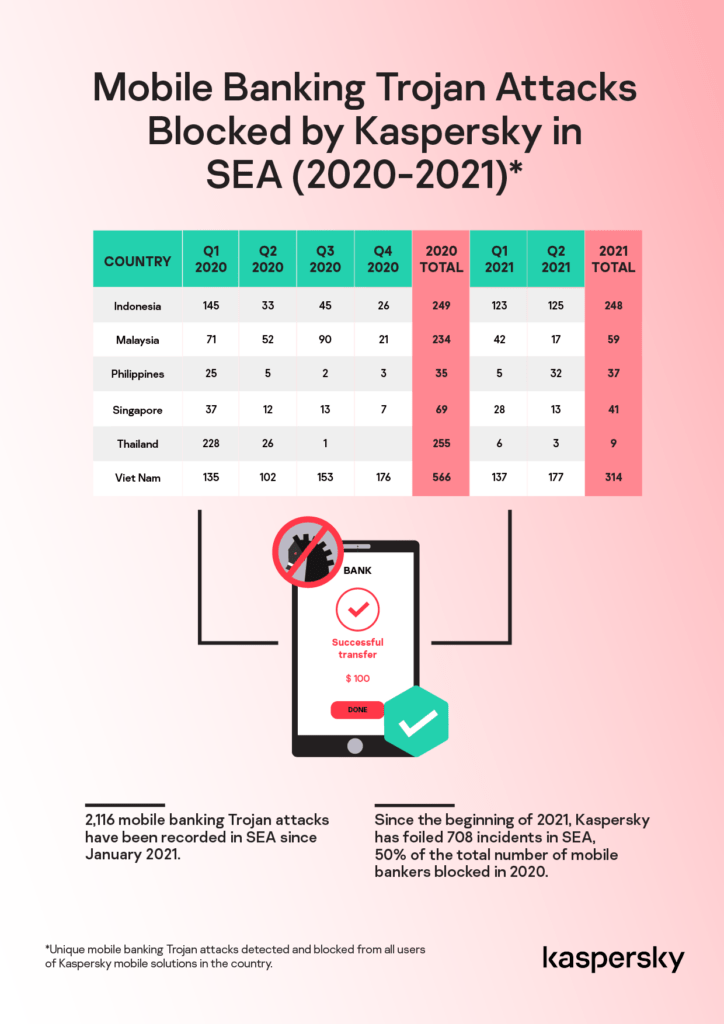
6 September 2021 – Global cybersecurity company Kaspersky today reveals its Q2 2021 mobile threat report for Southeast Asia (SEA) where it has monitored a 60% uptick in the number of attacks using malicious mobile bankers detected and blocked in the region.
Mobile banking Trojans – or bankers – are used by cybercriminals to steal funds directly from mobile bank accounts. These malicious programs typically look like legitimate financial apps, but when a victim enters their security credentials to try to access their bank account, the attackers gain access to that private information.
Overall, since the beginning of 2021, Kaspersky products have foiled 708 incidents across six countries in SEA. This is already 50% of the total number of mobile bankers blocked in 2020 which was 1,408.
Indonesia and Vietnam logged the most number of incidents during the first half of the year. However, globally, the two countries are not among the top 10 countries affected by this threat. Vietnam is only 27th and Indonesia is 31st as of June this year.
The five countries with most number of mobile banking Trojan detections in Q2 2021 are Russia, Japan, Turkey, Germany, and France.

*Mobile banking Trojans attacks detected from users of Kaspersky mobile security solutions in the country
While the number of mobile banking Trojan attacks in SEA remains low, 367 incidents from April to June 2021 versus 230 detections during the same period last year, the continuing pandemic continues to force users to start using mobile payment systems.
“We are almost at the second year of the pandemic which has fast tracked the mobile payment adoption in the region at a breakneck speed. During the beginning of this health crisis, our survey already showed that majority of internet users here have shifted finance-related activities online, like shopping (64%) and banking (47%),” Yeo Siang Tiong, General Manager for Southeast Asia at Kaspersky.
The same survey revealed that seven in 10 (69%) are worried about conducting financial transactions online and 42% of the respondents admitted to being afraid about someone accessing their financial details through their devices.
In addition, another Kaspersky report titled “Making Sense of Our Place in the Digital Reputation Economy” discovered majority (76%) of 861 respondents from SEA confirmed their intent to keep their money-related data away from the internet. The sentiment is highest among Baby Boomers (85%), followed by Gen X (81%), and Millennials (75%).
“Clearly, there is an awareness about the threats present when we do banking and payment transactions through our mobile phones. But there is still a gap between knowing and acting on it. So to help users from SEA embrace the power of their smartphone and also keep their finances safe, we suggest some practical tips but also encourage everyone to please look into using security solutions as a safety net in case they accidentally clicked a malicious link or downloaded a rouge mobile banking application,” adds Yeo.
Here are some practical tips from Kaspersky which you can do to beef up your money’s safety online:
Get a temporary credit card
Cyber criminals have developed incredibly sophisticated techniques and malware that can sometimes thwart your best efforts for safe online shopping. As another level of security for safe online shopping, you can use a temporary credit card to make online purchases, in lieu of your regular credit card. Ask your credit card company if you can be issued a temporary credit card number.
Just remember to avoid using these types of credit cards for any purchases that require auto-renewal or regular payments.
If temporary credit card is not possible, an alternative is to use a credit card with low credit limit.
Dedicate a computer to online banking and shopping
If you have more than one computer, it may be wise to dedicate one for online banking and shopping only. By avoiding using the computer for any other Internet browsing, downloading, checking email, social networking, and other online activities, you effectively create a ‘clean’ computer that is totally free of computer viruses and any other infections. For added security for safe online shopping, install Google Chrome, with forced HTTPS. This ensures you are visiting only secure websites.
Use a dedicated email address
Create an email address that you will use only for online shopping. This will severely limit the amount of spam messages you receive and significantly reduce the risk of opening potentially malicious emails that are disguised as sales promotions or other notifications.
Manage and protect your online passwords
Using strong passwords and using a different password for each online account is one of the most important things you can do for safe online shopping. We know it can be difficult to remember so many different passwords, especially when they are comprised of numerous letters, numbers, and special characters. But you can use a password manager to aid you in keeping strong passwords for multiple accounts.
Use a VPN
If you absolutely must shop online while using public Wi-Fi, first install a VPN (virtual private network). A VPN will encrypt all data that is transferred between your computer or mobile device and the VPN server, preventing hackers from hijacking and viewing any sensitive data you input.
On a lighter note, Now can get a special discount voucher of your choice with selected Kaspersky products available via https://www.lazada.com.my/shop/kaspersky/ or https://shopee.com.my/kaspersky.os,offer from 1 September 2021 till 30 September 2021.